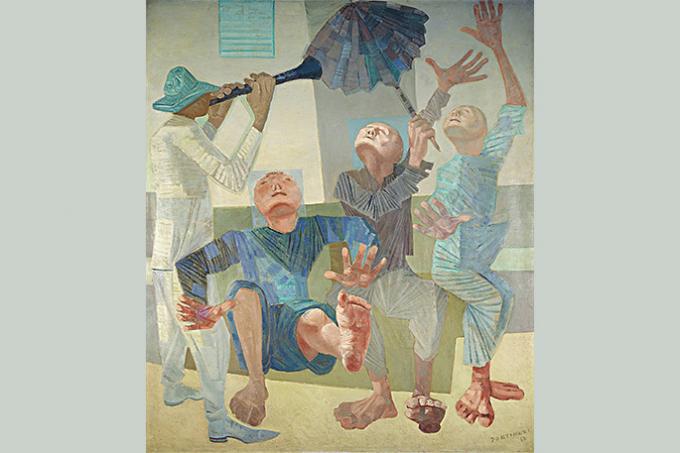Olavo Bilac (1865-1918) was an authentic Brazilian poet. Considered the best representative of parnassianism of our literature, he is the author of the lyrics of the Anthem to the Flag.
He wrote about scenes inspired by Greek and Roman antiquity, such as “Nero's Nap” and “The Fire of Rome”, as well as devoted himself to themes of a historical-nationalist character, as in “The Hunter of Emeralds”.
He did not always remain typically Parnassian. As one of the greatest lyrical poets, the poems of love and sensuality gain vibrant verses, full of emotion.
In addition to lyrical poems, and the poet wrote chronicles, textbooks, advertising texts and left fame as a humorous author. Under the guise of more than fifty pseudonyms, he collaborated intensively in the press at the time.
In the book “Alma Inquieta” poems appear in which the meditative and melancholy tone predominates, which is also the tonic of his book “Tarde” (1919), in which the concern with death and the meaning of life.
Biography

Olavo Braz Martins dos Guimarães Bilac was born in Rio de Janeiro, on December 16, 1865. He studied Medicine and Law, without having completed any of the courses. He worked as a journalist and school inspector, devoting much of his work and writings to education.
Olavo Bilac's first published work was “Poesias” (1888). In it, the poet already demonstrates to be identified with the proposal of the Parnassianism, as his poem “Profession of Faith” proves. The work was immediately successful and Bilac was soon considered “The Prince of Brazilian Poets”.
Olavo Bilac collaborated with several newspapers and magazines, such as Gazeta de Notícias and Diário de Notícias. He was secretary of the Pan American Congress in Buenos Aires and is a founding member of the Brazilian Academy of Letters, where he occupied chair number 15.
He devoted the last years of his life to propaganda for compulsory military service. Thus, he held a series of conferences in various capitals of the country, seeking to participate in the life of his time in democratic and civil campaigns.
Olavo Bilac died in Rio de Janeiro on December 28, 1918. In 2018, the centenary of the death of our "Prince of Poets" is commemorated.
Construction
- Poetry, 1888
- Milky Way, 1888
- Bushes of Fire, 1888
- Chronicles and Novels, 1894
- The Emerald Hunter, 1902
- The Travels, 1902
- Restless Soul, 1902
- Children's Poetry, 1904
- Critique and Fantasy, 1904
- Versification Treaty, 1905
- Literary Conferences, 1906
- Irony and Pity, chronicles, 1916
- Afternoon, 1919 (posthumous work)
poems
Milky Way
XIII
“Now (you shall say) to hear stars! Right
You've lost your mind!" And I will tell you, however,
That, to hear them, I often wake up
And I open the windows, pale with astonishment...And we talked all night while
The Milky Way, like an open canopy,
Sparkles. And, when the sun came, homesick and in tears,
I still look for them in the desert sky.You will now say: “Mad friend!
What conversations with them? what a sense
Do you have what they say, when they're with you?"And I will tell you: “Love to understand them!
Because only those who love can have heard
Able to hear and understand stars”.
In the mezzo del camin…
"Nel mezzo del camin…
I arrived. You've arrived. tired vines
And sad, and sad and tired I came.
You had the soul of dreams populated,
And I had a populated dream soul…
And we stopped suddenly on the road
Of life: long years, stuck to mine
Your hand, the dazzled view
I had the light that your gaze contained.
Today you go again… In the match
Not even the tears moisten your eyes,
Nor does the pain of parting move you.
And I, lonely, turn my face, and shiver,
Seeing your disappearing figure
At the extreme bend of the extreme path."
Portuguese language
"Latium's last flower, uncultivated and beautiful,
You are, at the same time, splendor and grave:
Native gold, which in impure denim
The rough mine among the gravels sails…I love you like this, unknown and obscure,
Loud tuba, simple lyre,
That you have the trumpet and the hiss of the storm
And the list of nostalgia and tenderness!I love your wild freshness and your aroma
Of virgin jungles and the wide ocean!
I love thee, O rude and painful language,In which from the maternal voice I heard: "my son!"
And when Camões wept, in bitter exile,
The blissless genius and the lackluster love!"
Read too:
- Parnassianism in Brazil
- Authors of Parnassianism in Brazil
- Anthem to the Flag



